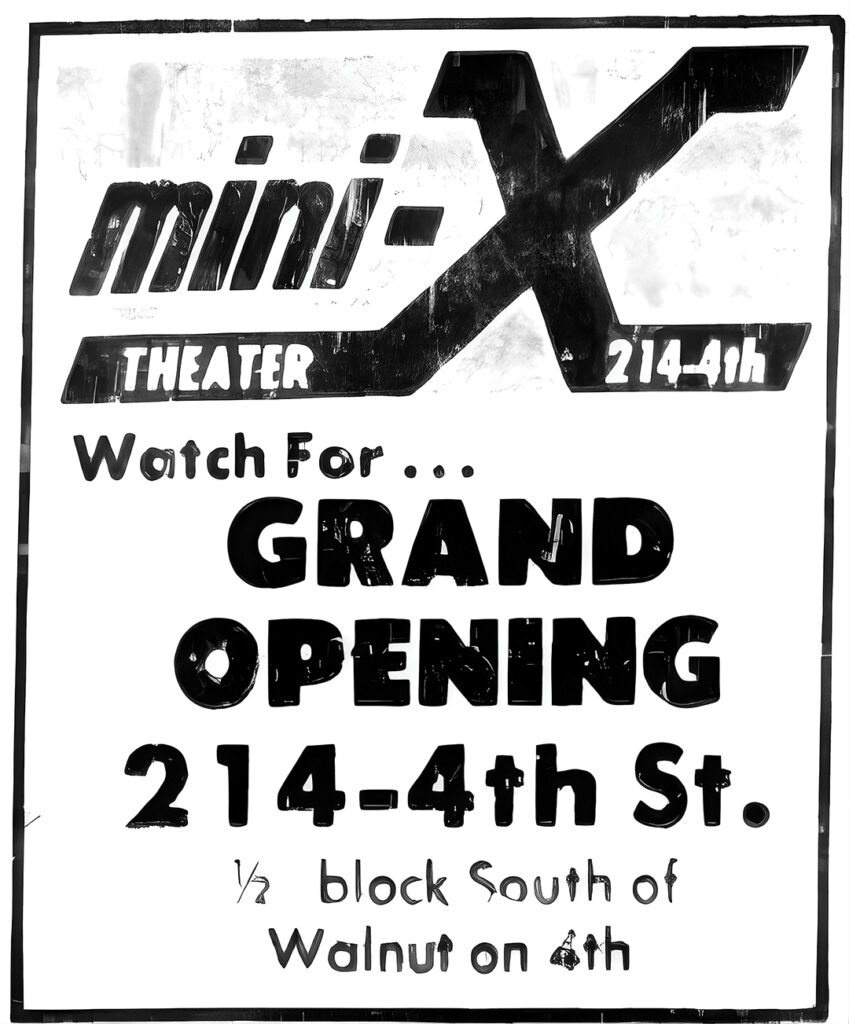Adult movie theaters in Des Moines
11/5/2025 The first adult movie theater I ever encountered was when I was staying in Hollywood during my days on “The Bachelor,” the reality television series on ABC. I was living with a buddy who lived off Santa Monica Boulevard and Western Avenue, very close to the Hollywood Forever Cemetery. It was the kind of neighborhood where you could never find a parking spot. If you did, it was because it was designated for street cleaning the next morning and you wake up to a $100 ticket on your window. I would park nearly a mile away and would walk on Santa Monica Boulevard. I would pass the Tiki Theatre, which is the last operating adult movie theater in Los Angeles. The screening room had red leather seats and, depending on the day, they would play shot video movies from the 1990s or something shot on film from the 1970s or 1980s. The sidewalk smelled like a mix of concrete and urine. Depending on the night, I would walk past a gaggle of prostitutes still on the clock.
The first adult movie theater I ever encountered was when I was staying in Hollywood during my days on “The Bachelor,” the reality television series on ABC. I was living with a buddy who lived off Santa Monica Boulevard and Western Avenue, very close to the Hollywood Forever Cemetery. It was the kind of neighborhood where you could never find a parking spot. If you did, it was because it was designated for street cleaning the next morning and you wake up to a $100 ticket on your window. I would park nearly a mile away and would walk on Santa Monica Boulevard. I would pass the Tiki Theatre, which is the last operating adult movie theater in Los Angeles. The screening room had red leather seats and, depending on the day, they would play shot video movies from the 1990s or something shot on film from the 1970s or 1980s. The sidewalk smelled like a mix of concrete and urine. Depending on the night, I would walk past a gaggle of prostitutes still on the clock.
There was a time when downtown Des Moines pulsed with more than neon marquees for Disney roadshows and MGM musicals. By the early 1970s, as the grand palaces fell to dust and television stole the suburbs, the city’s core found a new kind of glow — the pinkish hue of the adult theater. What began as a national cultural ripple reached our city like a delayed radio transmission, humming quietly through the 1970s and into the uneasy 1980s before they were shut down or ran out of town.
Before we get into these adult movie art houses, lets sideline on the difference between X rated and XXX. X rated was the original NC-17 rating from the MPAA. These films would, on occasion, play at major theaters. “Midnight Cowboy” (1969) starring Dustin Hoffman and Jon Voight was rated X due to its depictions of prostitution, homosexuality and violence. It was the only X rated movie to win an Academy Award for Best Picture. XXX was never a real rating developed by the MPAA. It was simply a marketing device developed by adult film producers. Rated X was meant to be extreme, so the joke was adult films were even more extreme and rated XX or XXX.
The first of these houses to make headlines locally was the Mini-X Theater, which opened in March 1971 at 214 Fourth St., just off Court Avenue. It wasn’t a grand place — one screen, modest seating and a hand-painted sign advertising “Adults Only.” But, it marked a shift. While the Paramount and the Des Moines Theatre had once defined the downtown night, the Mini-X represented the city’s changing pulse — a last refuge for the forbidden in an era obsessed with openness. In its small projection booth, the reels that once carried westerns and B-pictures now spun loops of hardcore films that had only recently escaped the censorship boards. Previously, these loops could only be seen through underground trades and in the adult bookstores like Page IV Books, which was located on Fourth Street and Court Avenue next to the Country Cove Tavern.
In 1970, the Supreme Court had loosened obscenity definitions, and films like “Deep Throat” and “Behind the Green Door” were touring the country with the air of cultural revolution. Even places as cautious as Iowa couldn’t ignore the wave. Downtown Des Moines — then half-empty after dark — offered cheap rents and leftover movie houses from the golden age. A few independent operators, sensing opportunity, converted them into adult cinemas. The Mini-X was joined by others over the decade including the Art Cinema and the Corral.
Police raids, moral campaigns and zoning fights became parts of a recurring ritual through the 1970s. City councils debated ordinances restricting “adult entertainment within so many feet of churches or schools,” though downtown’s vacant buildings and sleepy night life often made that a moot point. Yet, beneath the civic outrage was a quieter reality: These theaters survived because downtown was empty, and they were among the few businesses still drawing steady crowds.
The Blank family’s Central States Theatres and Fridley Theatres — the traditional exhibitors who had dominated Iowa screens at this time — wanted nothing to do with the adult market. Their empires had moved outward to suburban multiplexes and mall cinemas, leaving the old buildings behind. Into that vacuum stepped smaller operators who saw opportunity in the forbidden.
By the early 1980s, the scene had shifted again. Home video arrived like a wrecking ball, taking the secrecy of adult viewing out of the theater and into the living room. Suddenly, one could rent the classics without ever stepping downtown. The economic logic that had sustained the adult houses collapsed. The Mini-X limped into the decade, surviving mostly on inertia and late-night trade, while others closed quietly or converted to adult bookstores and video booths.
As the city began to reinvent itself in the 1990s, those spaces disappeared. The Mini-X closed, and the building was repurposed; others were bulldozed for parking lots or office expansions. When Court Avenue redeveloped into a nightlife district of restaurants and lofts, there was no trace of the era’s neon signs, no marker commemorating the strange chapter between the fall of the movie palaces and the rise of the sports bars. Meanwhile, adult bookstores still exist both in the city and in the outskirts off Interstate 80.
For anyone who is curious, the last Iowa adult movie house in operation is Cinema 16 in Waterloo. I visited the place a few years ago while working on “Taken Together, Who Killed Lyric and Elizabeth?” a three-part crime documentary on HBO. Cinema 16 has an adult gift shop in the front of the shop and a 100-person theater in the back. For $15, customers could purchase an all-day pass. And, yes, there were several people attending a screening. ♦
Kristian Day is a filmmaker and writer based in Des Moines. He also hosts the syndicated Iowa Basement Tapes radio program on 98.9 FM KFMG. Instagram: @kristianday | Twitter: @kristianmday














